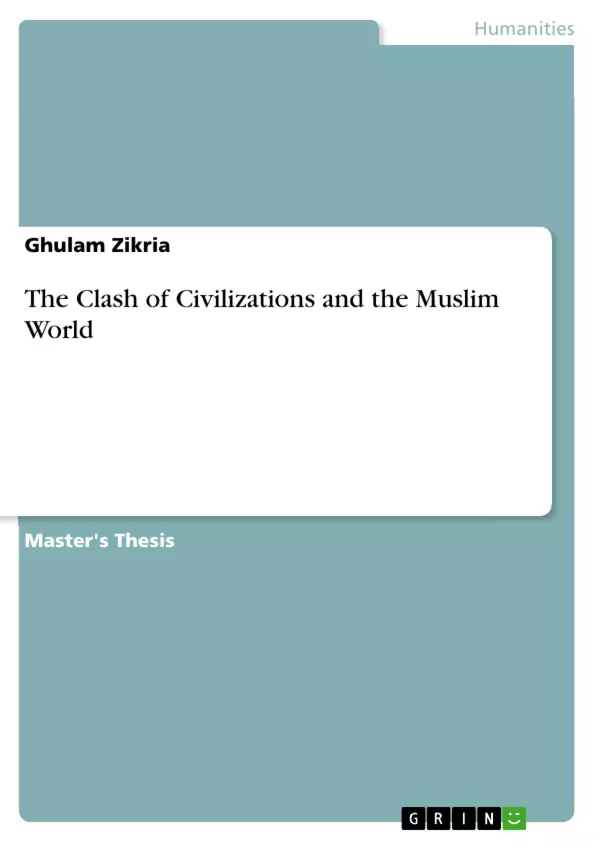The political phenomena of the contemporary world are more disturbing than they were in previous times. Upheaval and unease have prevailed throughout religions, economic systems, cultures, traditions and values, due to attempts by different civilizations to forcefully infuse particular ideas over the entire world.
Today, it is the Western and the Eastern Muslim world that are standing up against each other. Each of them is the preacher of a particular civilization. Their mutual conflicts have been going on for more than fourteen hundred years and still continue. The contemporary events of attacks in the last few years from the Western world to the Muslim territories like as Sudan, Somalia, Afghanistan, and Iraq including the threats of attacks on Iran, Yemen, and Pakistani tribal areas and the Muslim extremist activities against the Western benefits show the serious situation of the maintenance of peace and security condition in the entire world. What is the nature of clash? Why did they remain in conflict? What will be the future aspects of their relations?
While also regarding other religions, e.g. Judaism, Hinduism and Buddhism, this paper pursues the above-mentioned questions trying to find possibilities to unite those seemingly opposing cultures.
Inhaltsverzeichnis (Table of Contents)
- Preface
- Chapter 1
- Introduction
- Clash of Civilizations
- Paradoxical Mutual Understanding
- Future Possibilities
- Natural Process of Clash Among Groups
- Objectives of the Thesis
- Significance of the Thesis
- Organization of the Thesis
- Notes
- Chapter 2
- Types of Civilizations
- Significance and Types with Regard to Potential Clash
- The 'West' a Specific Civilization
- Eastern Civilizatioinal Distinctions
- Specific Jewish Civilizational Orders
- Muslim Religious Civilization: Discontents and Distinctions
- Notes
- Chapter 3
- The Muslim World: Specifications of Religion, Culture and Civilization
- The Muslim Civilization: Fundamental Religious Teachings
- Muslim Culture: Religion and Traditions
- Importance of Religion in the Muslim Life
- Israel with Regard to Muslim Perception: A Root Cause of Muslim World Problems
- The Muslim World: Unstable Peace Condition
- Notes
- Chapter 4
- Clash of Civilizations: The Muslim World and the 'West'
- Ruling over the World: the Muslim Religious Desire
- Discontents Between Islam and the West
- Disputed Definition of Welfare
- Westernization of the World
- Discontents of Contemporary Issues
- Notes
- Chapter 5
- Future Aspects of the Muslim World
Zielsetzung und Themenschwerpunkte (Objectives and Key Themes)
This thesis aims to examine the "Clash of Civilizations" theory as it relates to the Muslim world, specifically the relationship between Islam and the West. The work explores the historical, cultural, and religious factors that contribute to tensions and misunderstandings between these civilizations. It also delves into the future prospects of the Muslim world in a globalized context.
- The concept of "Clash of Civilizations" and its application to the Muslim world
- The historical and cultural differences between Islam and the West
- The role of religion in shaping the identities and values of both civilizations
- The impact of globalization on the Muslim world and its relationship with the West
- Potential future scenarios for the Muslim world and its interaction with other civilizations
Zusammenfassung der Kapitel (Chapter Summaries)
Chapter 1 introduces the concept of "Clash of Civilizations" and its relevance to the Muslim world. It examines the paradoxical nature of mutual understanding and explores future possibilities for interaction between civilizations. The chapter also discusses the natural process of conflict between groups and outlines the objectives and significance of the thesis.
Chapter 2 delves into the categorization of civilizations, focusing on the specific characteristics of the "West" and Eastern civilizations, as well as the unique features of Jewish and Muslim civilizations. The chapter analyzes the potential clash points between different civilizations and explores the discontents within the Muslim world.
Chapter 3 provides a detailed analysis of the Muslim world, emphasizing the defining features of its religion, culture, and civilization. The chapter examines the role of religion in Muslim life, explores the perception of Israel within the Muslim community, and discusses the factors contributing to the unstable peace conditions within the Muslim world.
Chapter 4 investigates the "Clash of Civilizations" in the context of the Muslim world and the West. It examines the historical and contemporary tensions between Islam and the West, analyzing the disputed definitions of welfare, the impact of Westernization on the world, and the discontents surrounding contemporary issues.
Schlüsselwörter (Keywords)
The thesis primarily focuses on the clash of civilizations, Islam, the Muslim world, the West, cultural differences, religious values, globalization, future scenarios, and contemporary issues. The work delves into the complexities of intercultural relations, exploring the historical and contemporary dynamics between Islam and the West within a globalized context. It further examines the role of religion in shaping identities and the potential challenges and opportunities for the Muslim world in the 21st century.
Frequently Asked Questions
What is the "Clash of Civilizations" theory?
It is a hypothesis that people's cultural and religious identities will be the primary source of conflict in the post-Cold War world.
How does the thesis view the relationship between Islam and the West?
The thesis explores 1,400 years of conflict and contemporary tensions, analyzing religious, cultural, and political discontents between the two civilizations.
What role does religion play in the Muslim world according to this study?
Religion is seen as the central pillar of life, shaping culture, traditions, and the perception of global political issues like the status of Israel.
What are the "discontents" mentioned regarding Westernization?
They refer to the friction caused by the perceived forced infusion of Western ideas, values, and definitions of welfare over the Muslim world.
Does the paper discuss other religions besides Islam and Christianity?
Yes, the study also considers the civilizational orders of Judaism, Hinduism, and Buddhism in the context of global peace and security.
- Quote paper
- Phd Ghulam Zikria (Author), 2009, The Clash of Civilizations and the Muslim World, Munich, GRIN Verlag, https://www.grin.com/document/371215



